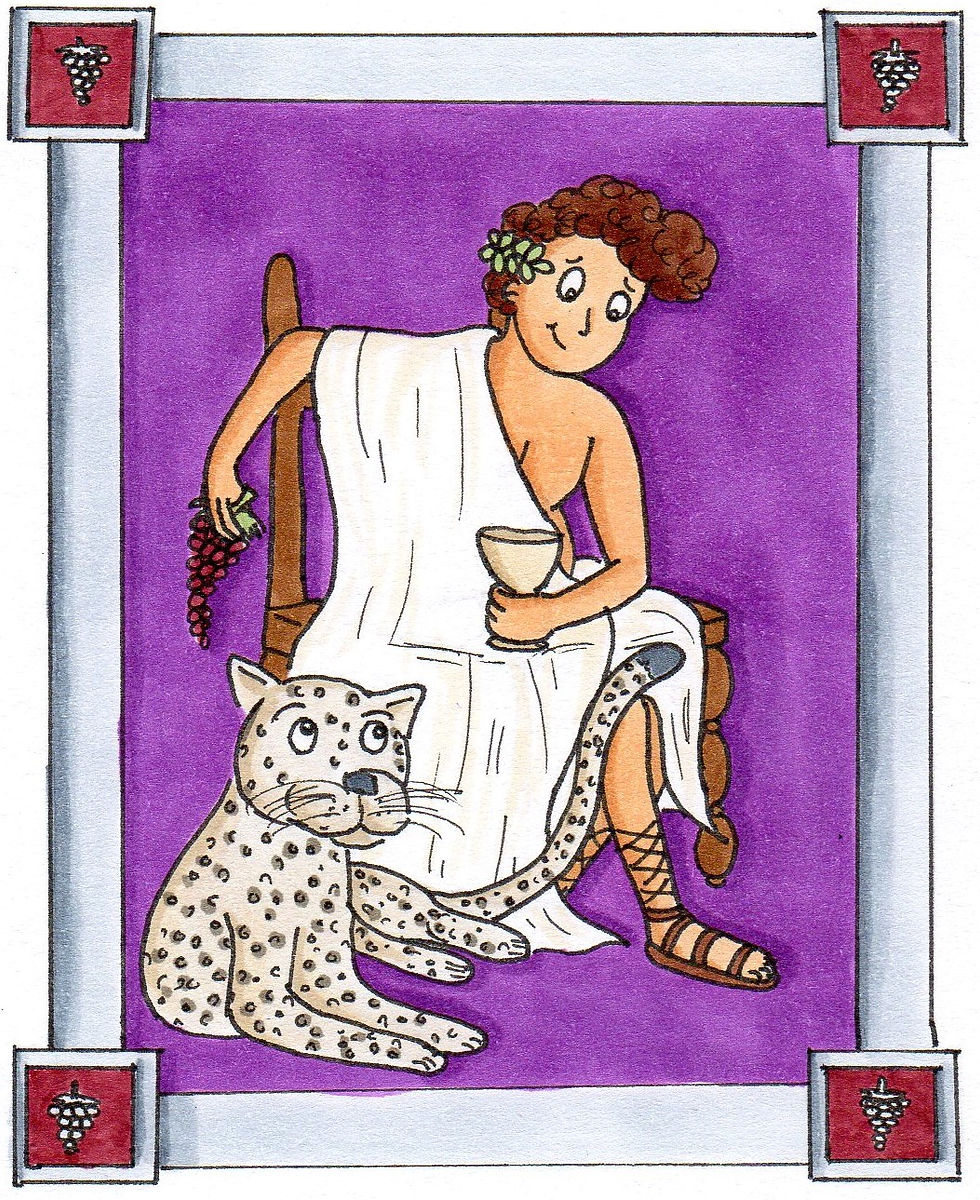
Dionysus
The God of Wine



Photo: Public domain, via Wikimedia Commons https://commons.wikimedia.org/wiki/File:Dionysos_Mosaic.jpg

Dionysus, the God of Wine

Roman Name: Bacchus
God of: Wine, but anything that involved having a mindlessly good time, in a rather out of control and silly way. Also – the theatre and dramatic performances belonged to him.
Parents: Zeus and a human woman named Semele.
Married to: A human woman named Ariadne, though they did not stay together.
Children: Dionysus had several children, who grew to be various kings and demigods, mostly (but not entirely) with his wife Ariadne.
Symbols: Wine and grapes obviously, but also panthers (who pulled his chariot), exotic clothes and the thyrsus (a kind of wand made out of fennel).
Location of Story: Theatre of Dionysus

Delphi watched the woman on the stage and tried to follow what she was saying. She, or rather actually, he – as all the actors in theatre were men, even the ones playing women – was making a long speech about why her husband had to die. It was very passionate. And a bit confusing.
Her following of the play wasn’t helped by the fact that she had missed the start, as it had taken a while to sneak into the Theatre of Dionysus without anyone noticing. But once the performance had started, the crowd seemed to ignore her. They all seemed entranced, almost hypnotised.
“Hey, what’s… what’s going on, then?”
Oh yes, except for the man sitting next to her. He just seemed drunk. Delphi tried to lean away from his wine-foul breath. She tried to whisper back.
“I think she’s upset because her husband, the king – the fat one with the fancy mask – killed their daughter. But that was before the play started. Now he’s come home. And there’s another woman who looks really sad. And a man who looks confused. And a group of men who keep interrupting. I think she’s going to kill him now or something. Or the other woman. Or something. I don’t know really.”
The man next to her hiccupped loudly.
“Still though… it’s beautiful, ain’t it?”
Delphi glanced over to him and then sighed, deeply.
“Oh, it’s you…”
“Hello, Dlel…phi!” The god slurred cheerfully. He was sat back with a cup of wine in his hands, with a large, slightly crazed grin on his face. Then, he seemed to remember something. “Hey… hey, can you still… turn things into… you know!” He snapped her fingers at her.
“I don’t want to talk about that,” said Delphi, quickly.
“Talk about what?”
“N… never mind.” They watched the speech for a few moments.
“Yeah, I think she’s going to kill the king. She looks really angry.” Delphi whispered.
“This is all about me, you know!” Dionysus declared.
“Ssshh!” Delphi had her finger up to her lips, but no-one else turned towards them.
“This is my festival!” The god took another big gulp of wine, some of it splashing onto their seats. The cup didn’t seem to be running out. “Everyone telling stories, drinking lots of wine, letting their hair down a bit!” He playfully prodded Delphi’s very tightly knotted-together braid.
She narrowed her eyes at him. “Not everyone.”
“You should… you should listen to your feelings more. You’re too…” he waved his cup around, spilling quite a lot of wine onto Delphi’s lap. “Thinky. Always thinking you are. That’s not what being alive is all about, is it? Take her.” He nodded towards the woman on stage. “Her name is Clytern… Clytemnis…. Clytunmes… whatever, and she’s the queen, right? And she’s pure feelings! Not thinking! It’s all… emotion. That’s my kind of thing, that is!” Dionysus burped happily and sat back, confident in some wisdom, well dispensed. He swirled his wine cup, sending a few more splashes in every direction. Delphi tried to move away and shook her head.
“No. He killed her daughter. She’s got good reasons to get revenge. She’s thought about it. She’s controlling her anger.”
“Rubbish!” Dionysus threw his hands up and quite a lot more wine splashed over Delphi’s head. She stood up and shouted before she knew what she was doing.
“Will you stop throwing wine over me?!”


Dionysus



A young god
Dionysus is the last of the twelve Olympians and was born much later than most of the others. In fact, he was born twice. Like many of these stories, it starts with Zeus falling for another woman – this time someone called Semele. They got on well, very well, and Semele became pregnant. However, one day she met an old woman who started talking to her. Semele told her that her child’s father was Zeus, king of the gods – but the woman was dismissive, saying that if he was truly Zeus, he would show her his true, brilliant form as he really was, without disguising himself as a man. Little did Semele know, but the old woman was Hera in disguise – and she knew exactly what she was doing.

Twice born
Semele asked Zeus if he would do anything for her, and when she agreed, she asked her question: show yourself as you truly are. Zeus howled in pain and frustration as he knew what would happen – but he was forced to go through with it. When he shed his disguise, his overwhelming power and might burnt Semele to ashes. Zeus was able to rescue their child however, and he cut open his thigh and put the unborn baby in his leg until he was ready to come out! Before too long, the infant Dionysus was born and was raised by nymphs and Silenus, a son of Hermes.

Creator of wine
Early in his life, it was Dionysus who first discovered how to make wine from grapes. There is even a story that the first vine came from a companion of his named Ampelos, who when he was dying, was transformed into the first vine by Dionysus. The god came to symbolise everything to do with alcohol, both good and bad. Dionysus was the party god, of having a great time – but also the bringer of bad luck and the cause of huge pain and destruction. Like with Demeter, there were strange and mysterious cults dedicated to him in ancient Greece, and his followers were wild, drunken and, often, terrifying.

Traveller
Before coming to Olympus, Dionysus spent many years travelling around the world and teaching mankind about wine, and how to party! However, this didn’t always end well – especially if people doubted that he was a god or didn’t like his wild behaviour. When a group of pirates failed to recognise him, he transformed them all into dolphins. He turned one king blind, and another named Pentheus, who had particularly insulted him, was killed when his mother, wife and other women of his land were all made so crazed by Dionysus that they literally ripped Pentheus apart!

Ariadne
Dionysus could be kind too – when he wanted to be. He rescued Ariadne from being stranded on a desert island, where Theseus had left her after fighting the Minotaur, and fell madly in love with her. They married and had many children, but things didn’t end well. There are many different tales of how Ariadne died – some say it was Perseus, who turned her to stone with the head of Medusa. In any case, Dionysus was so heartbroken that he journeyed all the way to the Underworld and succeeded in bringing back not just Ariadne, but his mother too. They were placed in the stars by Zeus, and Dionysus took his place as one of the Olympians, replacing Hestia, who decided to step aside to make room for him.

The god of theatre
Dionysus wasn’t just about getting drunk, however. OK, he was mostly about getting drunk, but he was also the god of the theatre. Every year, at the great Dionysia, three plays would be performed in his honour at the Theatre of Dionysus at the foot of the Acropolis in Athens. Many famous Greek tragedies and comedies were first performed there and are still performed today. Dionysus features in many of the plays, and it was said the god liked to dress up and perform in the plays himself. In this way, Dionysus was one of the most important gods to the ancient Greeks, his wildness standing as opposite to Apollo’s reason and truth. Loving a big party, the Romans were also fond of him, giving the name Bacchus, and his picture has been found in Roman tapestries and statues across Europe.


